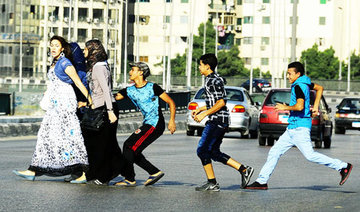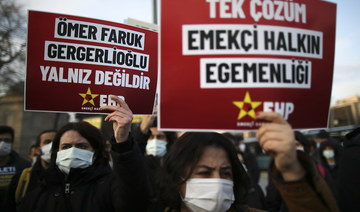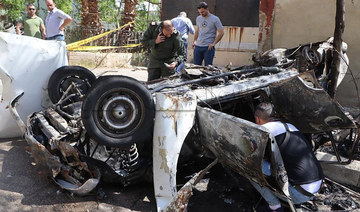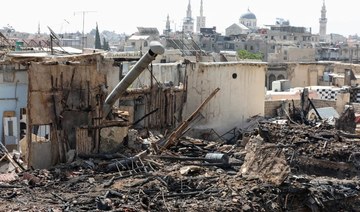CAIRO: Accusations of sexual misconduct directed at two prominent human rights lawyers in Egypt — one of them a former presidential hopeful — have roiled the country’s beleaguered civil society, which is already under unrelenting pressure from authorities.
The allegations, directed at former presidential hopeful Khaled Ali and another lawyer, were made in a private email sent by a woman in October that has since been widely shared on social media. Many have cast it as part of the global #MeToo campaign against sexual assault and misconduct, while accusing the activist community of closing ranks to avoid embarrassment.
The woman, currently living in Europe, has declined to give media interviews and has not filed a complaint with authorities. The Associated Press does not publicly identify victims of sexual assault and is not naming the second lawyer because no formal complaint has been made against him.
In the email, the woman alleged that Ali invited her to his downtown Cairo office in 2015 after other employees had gone home. The woman, who had recently quit her job at the rights organization founded and led by Ali, said he offered her a beer before he left to shower next door. When he came back, he asked her personal questions about two of her past relationships, she said.
“I finish the beer and tell him I need to leave because I have an appointment in the morning,” she recounted in the email. “He tries to convince me to stay over and that it’s getting late. I tell him no, I prefer to go,” she wrote. She said she left without further incident.
She said the other lawyer, who specializes in women’s rights, had suggested she spend the night at his place after an evening of heavy drinking at a downtown bar with friends in 2014. She said she took him up on the offer because she was drunk, and that he raped her that night.
She said she has been in therapy to deal with the trauma, and that her email was meant as a warning to women employed by rights groups. Two of her friends, who spoke on condition of anonymity to preserve her privacy, said she told them she decided to break her silence when she learned that Ali planned to run for president.
The lawyer denied the rape allegation in a phone interview with the AP, saying he had “consensual” sex with the woman. In the email, she acknowledged having consensual sex with him after the alleged rape.
Ali responded to the accusations leveled against himself in a Facebook post on Feb. 19, calling them “extremely shocking and surprising.” He said he had ordered his campaign and his Bread and Freedom party to investigate the allegations shortly after they surfaced and had refrained from commenting publicly until the investigation was complete.
The three-person panel of supporters cleared Ali of any wrongdoing but reprimanded him for mixing his personal life with his political work. The accuser questioned the panel’s objectivity and refused to cooperate with it.
“The mere thought that she entertains such thoughts about me and wrote an email reflecting them leaves me with no choice but to offer her an apology for the pain she suffered,” he wrote. “Although the findings of the investigation are in my favor, I must still take some of the blame.”
Ali resigned from his leadership of the party, as well as the rights group he founded. Several telephone calls and messages to Ali seeking comment went unanswered.
Supporters applauded his response, calling it a rare show of accountability in a conservative society where sexual harassment is rampant and sex crimes are rarely acknowledged or prosecuted.
Others say his campaign dodged the allegations while trying to get him on the ballot. Ali declared his intention to run for president in November but quit in January, citing intimidation by authorities. The panel released a summary of its findings after he abandoned his run.
President Abdel-Fattah El-Sisi is widely expected to win re-election in the March 26-28 vote after several potential candidates withdrew or were arrested. The only other candidate to make the ballot is a little-known politician who supports Sisi.
Egypt’s civil society, which played a key role in the 2011 uprising that toppled longtime autocrat Hosni Mubarak, has been the target of a sweeping crackdown since Sisi led the military overthrow of an elected Islamist president in 2013.
Several prominent activists have been arrested, while others have been banned from travel or had their assets frozen. Their organizations have been subject to draconian restrictions, and pro-government media routinely portray them as depraved agents of hostile foreign powers.
But critics within the rights community say none of that excuses the response to the allegations against Ali.
The “Girls’ Revolution,” a women’s rights group, issued a statement saying Ali’s supporters had not acted quickly enough.
“Although the leadership of the party was informed of the email in November, the campaign went on despite the suspected abuse,” it said.
More than 100 activists, including many women, signed a declaration saying the panel, which was appointed in December, “mirrored the state’s criminal justice system, complete with its deficiencies (and) lack of safety for those who complain.”
It said the handling of the case, like that of allegations against other public figures, was dominated by the “spirit of the clique” — a desire to shield prominent individuals from criticism and protect the international image of civil society groups, many of which received support from abroad before the latest crackdown.
Several prominent women’s rights activists declined to comment on the case.
But Mona Eltahawy, an Egyptian writer and activist based in New York, said the response from Ali’s supporters shows that “their revolution is not genuine because the essence of the things we are struggling against remain inside them.”
“The woman who wrote the email deserves much more justice than she has received so far,” she said.
Egypt’s embattled activists face a #MeToo reckoning
Egypt’s embattled activists face a #MeToo reckoning

Israel builds ‘cyber dome’ against Iran’s hackers

- Israeli cybersecurity agency had thwarted around 800 significant attacks since the Oct. 7 Gaza war erupted
- But some attacks could not be foiled, including against hospitals in which patient data was stolen
TEL AVIV: Israel’s Iron Dome defense system has long shielded it from incoming rockets. Now it is building a “cyber dome” to defend against online attacks, especially from arch foe Iran.
“It is a silent war, one which is not visible,” said Aviram Atzaba, the Israeli National Cyber Directorate’s head of international cooperation.
While Israel has fought Hamas in Gaza since the October 7 attack, it has also faced a significant increase in cyberattacks from Iran and its allies, Atzaba said.
“They are trying to hack everything they can,” he told AFP, pointing to Hamas and Lebanon’s Hezbollah movement but adding that so far “they have not succeeded in causing any real damage.”
He said around 800 significant attacks had been thwarted since the war erupted. Among the targets were government organizations, the military and civil infrastructure.
Some attacks could not be foiled, including against hospitals in the cities of Haifa and Safed in which patient data was stolen.
While Israel already has cyber defenses, they long consisted of “local efforts that were not connected,” Atzaba said.
So, for the past two years, the directorate has been working to build a centralized, real-time system that works proactively to protect all of Israeli cyberspace.
Based in Tel Aviv, the directorate works under the authority of the prime minister. It does not reveal figures on its staff, budget or computing resources.
Israel collaborates closely with multiple allies, including the United States, said Atzaba, because “all states face cyber terrorism.”
“It takes a network to fight a network,” he said.
Israel’s arch foe Iran is “an impressive enemy” in the online wars, said Chuck Freilich, a researcher at the Institute for National Security Studies, which is affiliated with Tel Aviv University.
“Its attacks aim to sabotage and destroy infrastructure, but also to collect data for intelligence and spread false information for propaganda purposes,” he said.
Iran has welcomed Hamas’s October 7 attack on Israel, which resulted in the deaths of 1,170 people, mostly civilians, according to an AFP tally based on Israeli official figures.
Israel’s retaliatory offensive against Hamas has killed at least 34,596 people in Gaza, mostly women and children, according to the Hamas-run territory’s health ministry.
Regional tensions have soared, particularly after Iran for the first time fired hundreds of missiles directly at Israel last month in retaliation for a deadly Israeli air strike on the Iranian consulate in Damascus.
It was the most dramatic escalation yet after a years-long shadow war of killings and sabotage attacks between Israel and Iran.
Freilich argued in a study published in February that Iran was relatively slow to invest in cyberwarfare, until two key events triggered a change.
First, its leaders took note of how anti-government protesters used the Internet as a tool to mobilize support for a 2009 post-election uprising.
In the bloody crackdown that crushed the movement, Iran’s authorities cut access to social media and websites covering the protests.
Then, in September 2010, a sophisticated cyberattack using the Stuxnet virus, blamed by Iran on Israel and the United States, caused physical damage to Tehran’s nuclear program.
Freilich said the attack “demonstrated Iran’s extreme vulnerability and led to a severe national shock.”
Since then, Iran has gained substantial expertise to become “one of the most active countries in cyberspace,” he said
While Israel is considered a major cyber power, Iran was only likely to improve, said Freilich.
He pointed to assistance from Russia and China, as well as its much larger population and an emphasis on cyber training for students and soldiers alike, adding that the trend was “concerning for the future.”
Atzaba insisted that the quantity of hackers is secondary to the quality of technology and the use it is put to.
“For the past two years, we have been developing a cyber dome against cyberattacks, which functions like the Iron Dome against rockets,” he said.
“With cyber dome, all sources are fed into a large data pool that enables a view of the big picture and to invoke a national response in a comprehensive and coordinated manner.”
The Israeli system has various scanners that continuously “monitor Israeli cyberspace for vulnerabilities and informs the stakeholders of the means to mitigate them,” he said.
Israel’s cyber strength relied on close cooperation between the public, private and academic sectors, as well as Israel’s “white hat” hackers who help identify weaknesses.
“We work hand in hand,” he said.
Kurds deny torturing detainees in north Syria camps
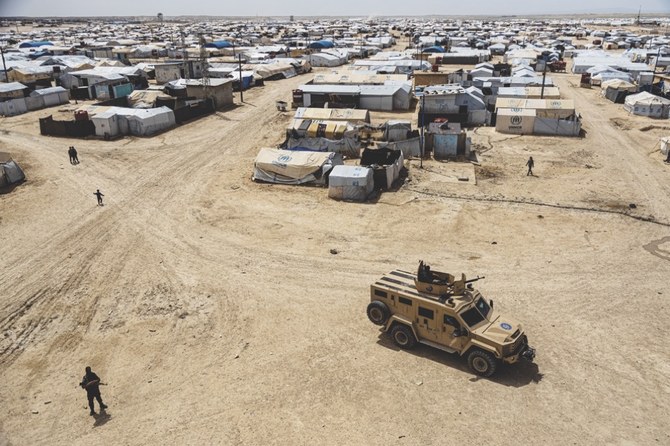
- Rights group alleges cruelty against Daesh militant prisoners and their families
JEDDAH: Kurdish authorities in northeast Syria on Thursday denied claims by Amnesty International that they tortured Daesh militants and their dependents detained in internment camps.
More than 56,000 prisoners with links to the Islamist militant group are still being held five years after Daesh were driven out of their last territory in Syria. They include militants locked up in prisons, and Daesh fighters’ wives and children in Al-Hol and Roj camps.
Amnesty secretary general Agnes Callamard said Kurdish authorities had “committed the war crimes of torture and cruel treatment, and probably committed the war crime of murder.”
The semi-autonomous Kurdish administration in northeast Syria said it “respects its obligations to prevent the violation of its laws, which prohibit such illegal acts, and adheres to international law.”
Any such crimes that may have been perpetrated were “individual acts,” it said, and asked Amnesty to provide it with any evidence of wrongdoing by its security forces and affiliates.
“We are open to cooperating with Amnesty International regarding its proposed recommendations, which require concerted regional and international efforts,” it said.
Kurdish authorities said they had repeatedly asked the international community for help in managing the camps, which required “huge financial resources.”
Al-Hol is the largest internment camp in northeast Syria, with more than 43,000 detainees from 47 countries, most of them women and children related to Daesh fighters.
Hamas is sending a delegation to Egypt for further ceasefire talks in the latest sign of progress

- US and Egyptian mediators have put to Hamas a proposal -– apparently with Israel’s acceptance — that sets out a three-stage process that would bring an immediate six-week ceasefire and partial release of Israeli hostages
BEIRUT: Hamas said Thursday that it was sending a delegation to Egypt for further ceasefire talks, in a new sign of progress in attempts by international mediators to hammer out an agreement between Israel and the militant group to end the war in Gaza.
After months of stop-and-start negotiations, the ceasefire efforts appear to have reached a critical stage, with Egyptian and American mediators reporting signs of compromise in recent days. But chances for the deal remain entangled with the key question of whether Israel will accept an end to the war without reaching its stated goal of destroying Hamas.
The stakes in the ceasefire negotiations were made clear in a new UN report that said if the Israel-Hamas war stops today, it will still take until 2040 to rebuild all the homes that have been destroyed by nearly seven months of Israeli bombardment and ground offensives in Gaza. It warned that the impact of the damage to the economy will set back development for generations and will only get worse with every month fighting continues.
The proposal that US and Egyptian mediators have put to Hamas -– apparently with Israel’s acceptance — sets out a three-stage process that would bring an immediate six-week ceasefire and partial release of Israeli hostages, but also negotiations over a “permanent calm” that includes some sort of Israeli withdrawal from Gaza, according to an Egyptian official. Hamas is seeking guarantees for a full Israeli withdrawal and complete end to the war.
Hamas officials have sent mixed signals about the proposal in recent days. But on Thursday, its supreme leader, Ismail Haniyeh, said in a statement that he had spoken to Egypt’s intelligence chief and “stressed the positive spirit of the movement in studying the ceasefire proposal.”
The statement said that Hamas negotiators would travel to Cairo “to complete the ongoing discussions with the aim of working forward for an agreement.” Haniyeh said he had also spoken to the prime minister of Qatar, another key mediator in the process.
The brokers are hopeful that the deal will bring an end to a conflict that has killed more than 34,000 Palestinians, according to local health officials, caused widespread destruction and plunged the territory into a humanitarian crisis. They also hope a deal will avert an Israeli attack on Rafah, where more than half of Gaza’s 2.3 million people have sought shelter after fleeing battle zones elsewhere in the territory.
If Israel does agree to end the war in return for a full hostage release, it would be a major turnaround. Since Hamas’ Oct. 7 attack stunned Israel, its leaders have vowed not to stop their bombardment and ground offensives until the militant group is destroyed. They also say Israel must keep a military presence in Gaza and security control after the war to ensure Hamas doesn’t rebuild.
Publicly at least, Israeli Prime Minister Benjamin Netanyahu continues to insist that is the only acceptable endgame.
He has vowed that even if a ceasefire is reached, Israel will eventually attack Rafah, which he says is Hamas’ last stronghold in Gaza. He repeated his determination to do so in talks Wednesday with US Secretary of State Antony Blinken, who was in Israel on a regional tour to push the deal through.
The agreement’s immediate fate hinges on whether Hamas will accept uncertainty over the final phases to bring the initial six-week pause in fighting — and at least postpone what it is feared would be a devastating assault on Rafah.
Egypt has been privately assuring Hamas that the deal will mean a total end to the war. But the Egyptian official said Hamas says the text’s language is too vague and wants it to specify a complete Israeli pullout from all of Gaza. The official spoke on condition of anonymity to talk about the internal deliberations.
On Wednesday evening, however, the news looked less positive as Osama Hamdan, a top Hamas official, expressed skepticism, saying the group’s initial position was “negative.” Speaking to Hezbollah’s Al-Manar TV, he said that talks were still ongoing but would stop if Israel invades Rafah.
Blinken hiked up pressure on Hamas to accept, saying Israel had made “very important” compromises.
“There’s no time for further haggling. The deal is there,” Blinken said Wednesday before leaving for the US
An Israeli airstrike, meanwhile, killed at least five people, including a child, in Deir Al-Balah in central Gaza. The bodies were seen and counted by Associated Press journalists at a hospital.
The war broke out on Oct. 7. when Hamas militants broke into southern Israel and killed over 1,200 people, mostly Israelis, taking around 250 others hostage, some released during a ceasefire on November.
The Israel-Hamas war was sparked by the Oct. 7 raid into southern Israel in which militants killed around 1,200 people, mostly civilians, and abducted around 250 hostages. Hamas is believed to still hold around 100 hostages and the remains of more than 30 others.
Since then, Israel’s campaign in Gaza has wreaked vast destruction and brought a humanitarian disaster, with several hundred thousand Palestinians in northern Gaza facing imminent famine, according to the UN More than 80 percent of the population has been driven from their homes.
The “productive basis of the economy has been destroyed” and poverty is rising sharply among Palestinians, according to the report released Thursday by the United Nations Development Program and the Economic and Social Commission for Western Asia.
It said that in 2024, the entire Palestinian economy — including both Gaza and the West Bank -– has so far contracted 25.8 percent. If the war continues, the loss will reach a “staggering” 29 percent by July, it said. The West Bank economy has been hit by Israel’s decision to cancel the work permits for tens of thousands of laborers who depended on jobs inside Israel.
“These new figures warn that the suffering in Gaza will not end when the war does,” UNDP administrator Achim Steiner said. He warned of a “serious development crisis that jeopardizes the future of generations to come.”
Syria says Israeli strike outside Damascus injures eight troops
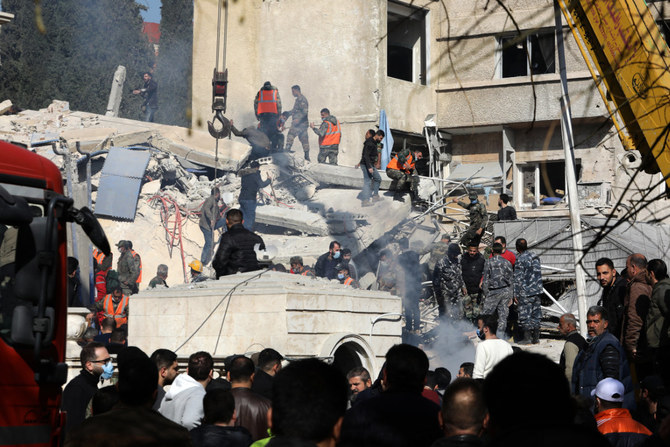
- A security source said the strike hit a building operated by government forces
- Defense ministry acknowledged only that the strike caused some material damage
An Israeli airstrike on the outskirts of Damascus injured eight Syrian military personnel late on Thursday, the Syrian defense ministry said, the latest such attack amid the war in Gaza.
The Israeli strike, launched from the occupied Golan Heights toward “one of the sites in the vicinity of Damascus,” caused some material damage, the Syrian defense ministry said in a statement.
The strike hit a building operated by Syrian security forces, a security source in the alliance backing Syria’s government earlier told Reuters.
The Israeli military said it does not comment on reports in the foreign media.
Israel has for years been striking Iran-linked targets in Syria and has stepped up its campaign in the war-torn country since Oct. 7, when Iran-backed Palestinian militants Hamas crossed into Israeli territory in an attack that left 1,200 people dead and led to more than 250 taken hostage.
Israel responded with a land, air and sea assault on the Gaza Strip, escalated strikes on Syria and exchanged fire with Lebanese armed group Hezbollah across Lebanon’s southern border.
The security source said the location struck in Syria on Thursday sat just south of the Sayyeda Zeinab shrine, where Hezbollah and Iranian forces are entrenched.
But the source said the site struck was not operated by Iranian units or Hezbollah.
Turkiye halts all trade with Israel, cites worsening Palestinian situation

- Turkiye’s trade ministry: ‘Export and import transactions related to Israel have been stopped, covering all products’
- Israel’s FM Israel Katz said that Turkish President Tayyip Erdogan was breaking agreements by blocking ports to Israeli imports and exports
ANKARA: Turkiye stopped all exports and imports to and from Israel as of Thursday, the Turkish trade ministry said, citing the “worsening humanitarian tragedy” in the Palestinian territories.
“Export and import transactions related to Israel have been stopped, covering all products,” Turkiye’s trade ministry said in a statement.
“Turkiye will strictly and decisively implement these new measures until the Israeli Government allows an uninterrupted and sufficient flow of humanitarian aid to Gaza.”
The two countries had a trade volume of $6.8 billion in 2023.
Turkiye last month imposed trade restrictions on Israel over what it said was Israel’s refusal to allow Ankara to take part in aid air-drop operations for Gaza and its offensive on the enclave.
Earlier on Thursday, Israel’s foreign minister said that Turkish President Tayyip Erdogan was breaking agreements by blocking ports to Israeli imports and exports.
“This is how a dictator behaves, disregarding the interests of the Turkish people and businessmen, and ignoring international trade agreements,” Israel’s Foreign Minister Israel Katz posted on X.
Katz said he instructed the foreign ministry to work to create alternatives for trade with Turkiye, focusing on local production and imports from other countries.



